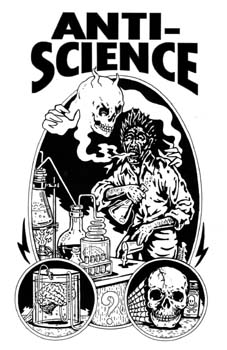In 2014, Vincent Ialenti wrote about deflated optimisms among European scientists grappling with political questions about their legitimacy, the capitalization of their expertise, and the frustrations of increasingly working under non-scientist managers. Did these ethnographic accounts presage the so-called post-truth, alternative-fact, nationalist-populist moment of anti-elite, anti-technocrat, anti-expert fervor we see today?
I have spent the few past years conducting anthropological research among many different kinds of experts working in the nuclear energy sector in general and on the challenge of managing high-level nuclear waste in particular. Periodically throughout this ethnographic process, I found the opportunity to reflect more generally on matters of expertise, broadly construed, with scientists, engineers, and other experts of a variety of nationalities working in variety of other sectors. Some of these experts worked in academia, others worked in government research institutes, some worked for corporations, others were retired or unemployed. Some were acquainted with my nuclear energy or nuclear waste management expert informants as friends from outside of work, as colleagues, or from their university years. Others were not acquainted with them at all. In September 2013, I had a long conversation of this kind with a scientist in his fifties with a background in Physics and Engineering.
Precisely where this conversation unfolded is almost beside the point: the concerns addressed, we have both observed, are pertinent in many cultures of expertise throughout both of our home continents of Europe and North America. And so too do they, I suggest, resonate with a host of challenges with which we as anthropologists increasingly grapple in our own professional contexts. Given Allegra’s proclivity for experimentation, I would like to use this space to momentarily step away from my usual focus on nuclear energy sector worlds and to give platform to this scientist’s critical perspectives on trends he saw as emerging widely in myriad cultures of expertise.
Our talk began when this expert, jovial and talkative, noted his skepticism with what he saw as a new set of imperatives that had emerged at his workplace – a partially state-funded, but increasingly privately-funded, applied technological research organization – over the past twenty or so years. This expert was quick to note that, when relaying his skepticism of these new imperatives to other scientists and engineers from other research institutes, universities, government agencies, and consultancies inside and outside his home country, they often responded with anecdotes from their own organizations that resonated closely with his own. So while the skepticisms he expressed – speculative, anecdotal, and based largely on intuition and hearsay – constitute just one expert’s critical reflections on just one context of expert practice, they are to be taken seriously. His broadest concern implicated growing pressures on the dispositions and the communicativeness of scientists, engineers, and other experts.
To make it in science these days you really have to be more of an extrovert. You’ve got to talk more. Once you could be the eccentric mad scientist who does things nobody understands. Now it doesn’t work like that. You cannot hide in your tower of expertise. You have to get funding. You have to know how to talk to the bosses who are, increasingly, not scientists. You have to understand their buzzwords, their code words, know their vocabulary, and use their dictionary. You must use the words they love in order to get funding. But, still, the gap between the scientists and the bosses is real. If you start using the terminology of the bosses too often, you might lose your credibility in your field among more competent scientists.
We agreed that the rise of such imperatives toward what he called ‘extraversion’, however, is not an entirely negative development. Communication skills, of course, lead to greater feedback on and public understanding of one’s expert work. They help forge what historian of science Peter Galison would call a ‘trading zone’ to enable mutual understanding and the cross-pollination of ideas across disparate fields and subfields. They facilitate more comprehensible reporting and documentation, which future generations will sorely need when attempting to understand the ins and outs of the work of their predecessors. And they foster keener discussions across disciplinary, linguistic, national, and cultural borders in increasingly specialized and globally interconnected cultures of expertise.
However, as my interlocutor noted, these shifts cannot be approached with entirely rose-colored glasses, especially when they become entangled with the vocabularies of research funding politics, of the audit, of investment, of legalese, and of administration. Indeed, as a physicist working down the hall from him once told me, the influx of transparency, traceability, and reporting requirements throughout his organization over the years had created what he saw as a climate in which ‘everyone is trying to advertise everything to everyone else’. It used to, as this non-native-English-speaking expert in his late fifties said of his career’s earlier years, be more ‘about the science’ than about reporting everything he does in ‘Oxford English’ and making tidy Excel spreadsheets. This coincided with a proliferation of funding agency schemes for fixed-term ‘projects’, of universities’ expectations that researchers secure (on their own) more and more external funding for their work, and of companies and agencies in many contexts relying increasingly on short-term subcontracted experts rather than signing on ‘lifers’ for long, stable, secure careers. As our conversation progressed, my interlocutor echoed this.
The unsettling thing is that today all your time is wasted begging for money. There is more and more this massive bureaucracy run by more business-oriented people counting money all the time. This is something growing, I mean, in all sorts of organizations. It is like a spreading disease. The problem is that we have highly respected scientists here who are absolute zeroes from a commercial point of view. We get fired up about this when discussing it in the coffee room. It is great to talk in the coffee room with likeminded critical people who are intelligent. But there we speak our own language. I guess what groups like us need today is an interpreter or a mediator between us and the bosses.
Communicating across such divides requires more than just an intellectual understanding of another set of vocabularies, buzzwords, and standards for gauging the quality of such an organization’s research outputs. Certain personalities are, of course, better suited to these tasks than others. And often, the expert noted, these sorts of personalities are of the very ilk of which his more established scientific colleagues have traditionally been skeptical. The ‘guardians of the best knowledge’ have long focused, I was told, on the content, substance, or rigor of one’s research and hence have been quicker to raise their eyebrows when too much ‘entertainment’ seeps into, say, an expert’s Powerpoint presentation. When presenting one’s work to a room full of experts at the very top of one’s field, he noted, one is in a ‘minefield’. That is, one ought to be more hesitant, concise, and careful – not more enthusiastic, effusive, and ebullient – than one would otherwise be in everyday conversation. This is because what is of interest to the guardians of the best knowledge is the quality of one’s words and findings—not their quantity, nor the tone of voice or eloquence of the researcher presenting them. Do such imperatives to create hype about one’s work among non-scientist or non-engineer managers, to network and to charm, to be intensely ‘productive’, to be one’s own pitchman, or to justify eloquently the relevance of one’s research to secure funding from non-scientists run counter to the calm, confident, mild-mannered comportment associated with traditional stereotypes of the astute scientist? If so, what will come, in contexts like these, of more contemplative experts – often tagged ‘eccentric’ or ‘introverted’ – soberly deliberating persuasive numbers, data, theories, and findings in drab monotone? What about those reluctant to jump on trendy flavor-of-the-week research bandwagons or those who favor of longer, slower, but more thorough research trajectories?
Being a scientist you are normally quite humble in how you express yourself. Let your research do the talking. But, talking to those guys, you must abandon that. You must present yourself as on top of the world: ‘I’m the owner of Europe and you are lucky to have the opportunity to talk to me’. Being, say, too modest is not seen as a virtue… In this case it might mean you get these extroverts who like to sit in coffee rooms, have small talk, and do nothing else. That’s the danger. This is just an intuitive sense I have… Beneath all this small talk, this politeness, this extrovert stuff, there has to be kind of a cool core. Being a nice guy is not enough. You must still understand stuff and that has been my message all the way.
In encounters with his organization’s increasingly business-oriented leaders, experts also had to navigate asymmetries between their and their managers’ and funders’ professional career outlooks. Whereas his organization had recently seen over eighty layoffs of scientists, there had not yet been a case of a higher-up manager being laid off for the sake of downsizing. While heartened that a rule allowing bosses to be laid off had recently been implemented, he noted his skepticism about whether the necessary cost-cutting within the organization – ongoing in many universities, research institutes, funding agencies, and consultancies since the global financial turmoils of 2007-2008 – would indeed play out in such a way. That being said, the infusion of financial, business, and managerial expertises steering the upper echelons of this particular technological research organization had not proven entirely negative for him and for his colleagues. Having bosses who understood little about what they did as experts and who almost never showed their faces in the experts’ offices or laboratories had its perks. Things were indeed different back in the ‘old days’ when scientists, engineers, or other experts working there would simply rise in the ranks to become the organization’s leadership. Then, young recruits – if they were to propose research that might challenge substantively the scientific findings upon which their superiors’ reputations had been predicated – faced impasses to moving their careers forward. Today, this problem has been all but obviated.
Also worthy of concern, the expert noted, is the increasing visibility of what he called the media-friendly ‘one-handed scientist’.
Scientific discussion works because scientists are ‘are on one the hand, on the other hand’ people. Scientists should not be one-handed: good scientists have a certain vagueness in expression so that the more experienced and the better a scientist, the less he or she is giving you straightforward opinions that are easy to digest… Young scientists in my team like making absolute statements, say, in their theses. My standard comment is, ‘no, you must kind of dilute this, qualify it, say that this is so because we have this kind of evidence’… In this way, the two-handed scientist is not so nice to the one-eyed journalist who would like a clear opinion from him or her. Whenever you talk to an experienced scientist, it is always such that you can never really get his or her neck in a loop. You can’t nail him or her down.
A one-handed scientist was said to, more often than not, be an expert who – perhaps feeling like he or she has not been given the recognition he or she deserves within his or her own field – frequently takes hard opinions publically on issues, adopts narrow activist stances, and brings internal scientific controversies to the media.
The thing is, they get the recognition, but not necessarily from the people they would like to get it from. Your respected colleagues might think that okay, now this person has sort of sold himself or herself out to the media. Now they’re in a different category altogether. Often, if you want to be a serious scientist, you don’t talk too much to the media. You talk in your own circles and you criticize things in your own circles. There might be quite hectic debates in some project meetings, but they are kind of keeping their dirty laundry in house. That is how the scientific process works. You may disagree heavily on some issues, but outside to the public and media you just say that there is some scientific discussion going on.
Such skepticisms of emerging trends in expert cultures – in this case, implicating imperatives toward extroverted expertise, one-handed scientists, and attention-seeking experts who air their ‘dirty laundry’ in public – are examples of the sorts of reflective critiques of today’s regimes of knowledge-creation and technological development manifesting within experts’ insider worlds. As such, they are accessible to ethnographers who venture to engage them in the field with the aim of opening them to critical scrutiny and further elaboration by humanists, social scientists, and other analysts. It is also the case that if such critiques could be thought to resonate (or not resonate) with imperatives emerging within still other cultures of expertise – like, say, those of Anthropology – then perhaps they could shed light on imperatives that contour our own expert practices and vice versa. At any rate, what is certain is that further ethnographic work within contemporary cultures of expertise is especially necessary in the present moment. Perhaps proclamations like those in Tom Nichols’ December 2013 blog post The Death of Expertise can shed some light on why.
More seriously, I wonder if we are witnessing the ‘death of expertise’: a Google-fueled, Wikipedia-based, blog-sodden collapse of any division between students and teachers, knowers and wonderers, or even between those of any achievement in an area and those with none at all… what I fear has died is any acknowledgement of expertise as anything that should alter our thoughts or change the way we live. A fair number of Americans now seem to reject the notion that one person is more likely to be right about something, due to education, experience, or other attributes of achievement, than any other… we now live in a world where the perverse effect of the death of expertise is that, without real experts, everyone is an expert on everything… There are no longer any gatekeepers: the journals and op-ed pages that were once strictly edited have been drowned under the weight of self-publishable blogs (like, say, this one). There was once a time when participation in public debate required submission of a letter or an article, and that submission had to be written intelligently, pass editorial review, and stand with the author’s name and credentials attached.
Alongside this, there have also been skepticisms voiced about shifts in public understandings of cultures of expertise in, for example, my home country, the United States. For instance, a 2012 Scientific American article noted the ‘anti-intellectual conformity that is gaining strength in the U.S. at precisely the moment that most of the important opportunities for economic growth, and serious threats to the well-being of the nation, require a better grasp of scientific issues’. Parsing what ‘has turned so many Americans against science’, the author noted politicizations of expert knowledge gaining ground on both sides of the political spectrum (in debates about stem cell research, vaccines, climate change, evolution etc). He also noted how ‘the intellectual tools currently being used by the political right’ to foster anti-scientism have origin in the ‘academic left’, which has since the 1960s-70s drawn ‘ideas from cultural anthropology and relativity theory to argue that truth is relative and subject to the assumptions and prejudices of the observer’. Tracing how this has recast science as ‘just one of many ways of knowing’ that is ‘neither more nor less valid than others’, the author lamented how journalists no longer feel compelled to ‘dig to get to the truth’. Now, they opt rather to ‘simply present “both sides” of contentious issues’ to fabricate a ‘false balance’ that transforms debates about topics over which experts once had credible authority into mere ‘warring opinions’. But have such imperatives to inclusively balance a diversity of perspectives really come to outweigh the imperatives to weigh the rigor, quality, or legitimacy of one perspective over another that once gave experts their authority?
 Answers to these questions are, of course, unclear. But while in the United States the most explicit anti-science or anti-academic rhetoric surely comes from the political right, it is clear that this more implicit mainstreaming of distrust in cultures of expertise defies any locatable position on the political spectrum or any divide separating hard sciences from soft sciences. Such conditions, I suggest, underscore the need for more ethnographic research to be conducted within cultures of expertise now and in the future. This is especially so given the concurrent entrenchment of what computer scientist Cyril Labbé has called the ‘spamming war started at the heart of science’—that is, that ever-more-intense pressure to publish with frequency that now affects researchers from all fields, from Anthropology to Physics, from Theology to Mathematics. Physicist Peter Higgs recently articulated his own frustrations with such growing imperatives in a way that surely mirrors frustrations often articulated in Anthropology. In December 2013, the Nobel laureate expressed his sense that he ‘wouldn’t be productive enough for today’s academic system’, noting too his doubts as to whether ‘work like Higgs boson identification’ would even be ‘achievable now as academics are expected to “keep churning out papers”. So, as we are all entangled with these shifts unfolding within myriad cultures of expertise, is it time for us to embrace the unifying tag ‘expert’ as a source of inspiration, motivation, and pride for highly trained people of all fields? Could further ethnographic research on cultures of expertise – in the sciences, in engineering, in the social sciences, in the humanities etc – aid in navigating a present in which events like ‘The Arts & Humanities: Endangered Species?’ are organized and in which entire academic fields are targeted by political forces?
Answers to these questions are, of course, unclear. But while in the United States the most explicit anti-science or anti-academic rhetoric surely comes from the political right, it is clear that this more implicit mainstreaming of distrust in cultures of expertise defies any locatable position on the political spectrum or any divide separating hard sciences from soft sciences. Such conditions, I suggest, underscore the need for more ethnographic research to be conducted within cultures of expertise now and in the future. This is especially so given the concurrent entrenchment of what computer scientist Cyril Labbé has called the ‘spamming war started at the heart of science’—that is, that ever-more-intense pressure to publish with frequency that now affects researchers from all fields, from Anthropology to Physics, from Theology to Mathematics. Physicist Peter Higgs recently articulated his own frustrations with such growing imperatives in a way that surely mirrors frustrations often articulated in Anthropology. In December 2013, the Nobel laureate expressed his sense that he ‘wouldn’t be productive enough for today’s academic system’, noting too his doubts as to whether ‘work like Higgs boson identification’ would even be ‘achievable now as academics are expected to “keep churning out papers”. So, as we are all entangled with these shifts unfolding within myriad cultures of expertise, is it time for us to embrace the unifying tag ‘expert’ as a source of inspiration, motivation, and pride for highly trained people of all fields? Could further ethnographic research on cultures of expertise – in the sciences, in engineering, in the social sciences, in the humanities etc – aid in navigating a present in which events like ‘The Arts & Humanities: Endangered Species?’ are organized and in which entire academic fields are targeted by political forces?
I began this post by painting an ethnographic portrait of but one expert’s way of coming to know shifts that have emerged over roughly the past two decades within his own particular institutional context. Doing so unveiled a number of situation-specific skepticisms of how a permeation of sensibilities – inextricable from the logics of finance, management, administration, and capital – at the upper echelons of the applied technological research organization at which he worked had led to what he saw as unsavory consequences. In light of this, I wonder: what other skepticisms of similar or dissimilar shifts are being cultivated in contexts of expert practice elsewhere? Do such skepticisms resonate with those being articulated by experts at the applied technological research firm where my interlocutor developed his career? How might such articulations be accessed ethnographically and what can they teach us about commonalities and differences that exist at present between expert cultures of, say, science and engineering and expert cultures of the humanities and social sciences? And what sorts of shifts do fun, fast-paced, upbeat, and productive blog websites – like, for instance, Allegra: A Virtual Lab of Legal Anthropology – usher in within our own contexts of anthropological practice? Do they, for instance, serve to stave off or, rather, push forward shifts resembling (a) the allegedly emerging ‘Death of Expertise’ articulated by Nichols and/or (b) emerging imperatives resonant with those articulated by my skeptical interlocutor?
This post was first published on 4 June 2014.






